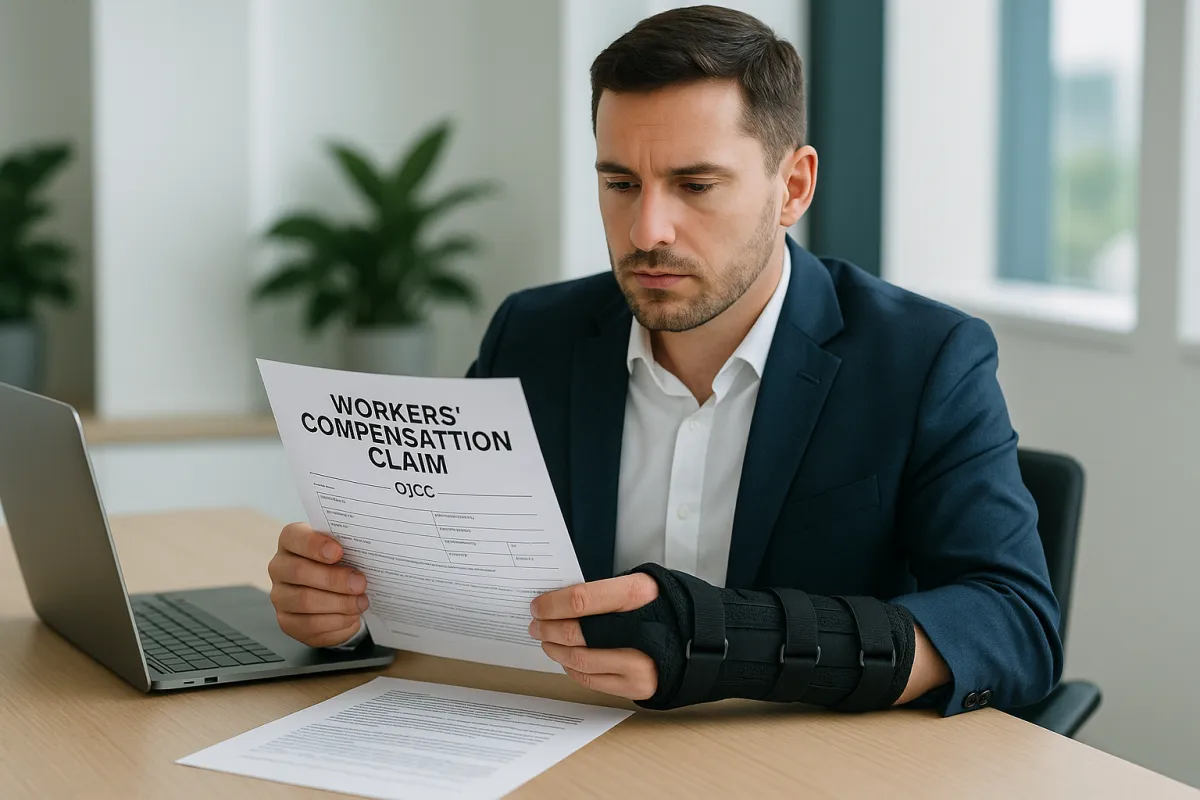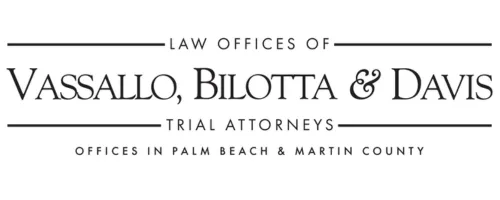Common Reasons for Workers Comp Denial
Common Reasons for Workers Comp Denial: Why Your Workers’ Compensation Claim Was Denied

If you’ve been injured at work in Florida and had your workers’ compensation claim denied, you’re not alone. Denials happen for many reasons, often leaving employees frustrated and uncertain about their next steps. Understanding why your claim was denied is the first step toward securing the benefits you deserve. At Vassallo, Bilotta & Davis, we help Florida workers navigate the complex workers’ compensation process. In this guide, we’ll explore the 10 most common reasons workers’ comp claims are denied, empowering you with the knowledge to address these challenges and protect your rights.
Understanding Workers’ Compensation Denials in Florida
If you’ve suffered a work-related injury in Florida and your workers’ compensation claim was denied, you’re not alone. Many hardworking Floridians encounter this frustrating situation and wonder what went wrong and how to move forward. The workers’ compensation system is meant to protect employees, but numerous challenges can arise throughout the claims process, leading to unexpected denials. Exploring why denials happen—and the most common reasons for workers comp denial—can empower you to protect your rights, build a stronger case, and pursue the benefits you deserve. Here’s what every injured worker should know about navigating denials in Florida’s unique legal landscape.
Key Facts About the Florida Workers’ Compensation System
The Florida workers’ compensation system is designed to provide employees with medical care and lost wage benefits if they’re injured on the job, regardless of fault. However, navigating this system can quickly become complex, especially when claims are denied for reasons that might seem unclear. One of the most significant hurdles facing workers is understanding the common reasons for workers comp denial, which often stem from missteps in reporting, documentation challenges, or disputes over the nature of the injury itself. Unlike traditional lawsuits, workers’ compensation claims rely on prompt reporting and compliance with specific deadlines, meaning any delay or error can become grounds for denial. Additionally, insurance companies and employers in Florida are well-versed in finding ways to minimize their liability—sometimes actively seeking information or inconsistencies that could justify rejecting your claim. This is particularly true in cases where there are questions about whether an injury truly occurred in the workplace or if an underlying medical issue pre-dated the incident. Knowing how these issues are assessed—and what legal standards apply in Florida—helps injured workers stay a step ahead and reduce their risk of denial. Effective strategies for overcoming workers’ compensation denials in Florida start with a strong understanding of the system’s procedures and potential pitfalls. Consulting with experienced advocates like Vassallo, Bilotta & Davis ensures you have guidance tailored to your unique situation. If you’ve faced a denial, you’re not out of options—armed with the right knowledge and support, you can contest that decision and fight for the benefits you’re due.
Delayed Reporting and Missed Deadlines
Timely reporting is absolutely critical in Florida workers’ compensation claims, and it’s an area where many valid claims falter. Waiting too long to inform your employer or missing essential deadlines can easily lead to a denial, even if your injury is legitimate. These time sensitive requirements are designed to ensure a swift investigation and care, but they also create pitfalls that employers and insurance companies can exploit. Understanding how timing affects your workers’ compensation rights, the specific deadlines that apply, and the consequences of delays is key to protecting your claim. In the following section, you’ll learn why acting quickly can make all the difference and get insights on navigating these rules confidently.
How Timing Can Make or Break Your Claim
When it comes to Florida workers’ compensation, the clock starts ticking the moment a workplace injury or illness occurs. State law requires you to report your injury to your employer as soon as possible—ideally within a matter of days, but officially within 30 days of the incident. If you wait too long, even a minor delay can raise doubts about the legitimacy of your claim or give the insurance company a reason to argue that your injury wasn’t work related. This is one of the most common pitfalls claimants face, as it’s easy to underestimate the importance of immediate reporting when you’re dealing with pain, confusion, or fear of retaliation. Deadlines don’t stop with reporting the injury. After initial notification, there are additional timeframes for seeking medical care, filing formal paperwork, and responding to requests from your employer or their insurance carrier. Missing any one of these steps can make your entire claim vulnerable. Insurance adjusters are trained to look for these gaps; even an honest mistake can be enough for them to issue a denial. That’s why keeping records of all communications and following each procedural step is crucial—something that legal advocates like Vassallo, Bilotta & Davis emphasize to every client. If you’re worried you might have missed a deadline, don’t give up hope. Florida law provides a few exceptions, such as if your employer had “actual knowledge” of your injury, or if extraordinary circumstances prevented timely reporting. Still, your best bet is always to act quickly and document everything. The experienced team at Vassallo, Bilotta & Davis can review your situation, identify any possible avenues for appeal, and help you gather evidence to show you acted in good faith. Don’t let a technicality cost you the benefits you deserve—reach out early and get experienced legal guidance to keep your case on track.
Lack of Evidence or Inconsistent Information
One of the most frequent stumbling blocks for Florida workers pursuing compensation is a lack of strong evidence or inconsistencies in the documentation submitted with their claim. Even after navigating tight reporting deadlines, claimants must present clear, compelling records that leave no room for doubt about the origin and extent of their injury. Discrepancies in statements, incomplete medical reports, or missing accident details often give insurance companies a reason to challenge a claim’s validity. Understanding the pivotal role of credible documentation—and learning what can cause inconsistencies—can help workers avoid denials and build a more robust case moving forward.
The Impact of Documentation on a Claim’s Success
Proper documentation isn't just a formality in Florida workers’ compensation cases—it’s the lifeblood of a successful claim. Insurance companies and employers scrutinize every detail, so any gaps, contradictions, or missing records can become a substantial hurdle. Comprehensive documentation starts at the moment of the injury. Immediate incident reports, consistent medical evaluations, and thorough records of all communications with your employer and healthcare providers are essential. If you don’t keep up with this paper trail, insurers may claim your injury isn’t work-related or that it didn’t happen the way you described.
One of the most common pitfalls is inconsistent information across documents. For instance, if your initial report to your employer differs from the medical diagnosis noted by your doctor, insurers view this as a red flag. Minor discrepancies may arise from stress or misunderstanding, but without clarification, they’re leveraged to question your credibility. This is why it’s critical to communicate clearly and keep all supporting documents organized —from photos of the injury site, to names of witnesses, to every healthcare appointment related to your injury.
Vassallo, Bilotta & Davis understands the importance of meticulous documentation and offers guidance on how to gather, organize, and present evidence to strengthen your case. They recommend keeping a personal file with all claim-related paperwork and encouraging clients to write down their account of what happened as soon as possible, while memories are still fresh. If you notice an error or omission, address it immediately and notify all relevant parties in writing. Don’t let an avoidable paperwork mistake derail your claim—arm yourself with accurate, detailed documentation and seek experienced legal help if you encounter any obstacles. Taking these steps increases the likelihood of success and reinforces your position if your claim is questioned or denied.
Disputes Over Workplace Injury vs. Preexisting Conditions
One of the trickiest hurdles in Florida’s workers’ compensation claims is the dispute between a true workplace injury and a preexisting medical condition. Insurance companies and employers routinely seek ways to argue that an employee’s pain or impairment wasn’t actually caused by a work incident, but rather by a health issue that existed before the job related event. Successfully overcoming these disputes requires precise documentation, a knowledgeable legal partner, and a commitment to building a compelling narrative backed by medical history. Understanding what evidence is relevant and how to present it are crucial steps in ensuring your claim isn’t unfairly denied due to these complex issues.
Clarifying Medical History for a Stronger Case
If you’re facing a denial or challenge to your workers’ compensation claim based on preexisting conditions, clarifying your medical history becomes the cornerstone of your case. Contrary to what some insurance companies may suggest, having a prior condition doesn’t automatically disqualify you from receiving benefits for a valid workplace injury. In Florida, the law allows for compensation even when a work-related event aggravates, accelerates, or combines with a prior medical issue — but only when you can show clear and convincing evidence that the workplace incident is the major contributing cause of your current symptoms. This makes it crucial to distinguish old injuries or longstanding health issues from new harm caused by work. Start by requesting copies of all relevant medical records from both before and after the workplace injury. Compare physician notes, diagnosis reports, and test results to highlight changes in your condition directly following the incident. Be candid with your doctors about prior injuries or health problems, and work with them to carefully document any new symptoms, restrictions, or therapies that resulted specifically from your workplace accident. This transparency helps prevent allegations of omission or fraud while giving your care providers the information they need to support your claim. Detailed, chronological records — including work incident reports, witness statements, and thorough accounts from treating physicians — can demonstrate that it was the workplace event, not just a longstanding ailment, that triggered your current need for care. In some cases, you may benefit from independent medical evaluations to offer a neutral perspective on causation. Legal advocates like Vassallo, Bilotta & Davis are adept at parsing through complex medical histories and assembling evidence in a narrative that strengthens your credibility while addressing every potential point of dispute. Their experience can be the key factor in ensuring your version of events is recognized and your rights to compensation are protected. Don’t let confusion over medical history derail your pursuit of benefits. Take proactive steps to clarify the facts, keep communication lines open with medical professionals, and consult with experienced workers’ compensation attorneys who specialize in navigating these challenging disputes. With the right strategy and support, it’s possible to overcome denials rooted in preexisting conditions and secure the compensation you deserve for injuries truly linked to your work.
Employer and Insurance Company Tactics
After navigating hurdles like timely reporting and proper documentation, claimants often encounter another substantial obstacle—how employers and insurance companies actively contest or undermine valid workers’ compensation claims. Tactics used to dispute or discredit your case can be subtle or direct, ranging from questioning the incident details to leveraging procedural technicalities. Understanding these common methods isn’t just enlightening—it’s crucial for anticipating potential challenges and preparing a smart, composed response. By learning how these organizations operate, injured workers can protect their rights, minimize the risk of further denials, and ensure their case stands on firm ground from the start.
Common Strategies Used to Challenge Claims
Employers and insurance companies in Florida have a clear financial incentive to minimize their payout on workers’ compensation claims, and over time, they’ve developed a toolkit of strategies to achieve this. One of the most common approaches starts with closely scrutinizing the initial incident report and any accompanying evidence. Adjusters may probe for inconsistencies in your account or between your statement and witness testimonies, aiming to cast doubt on whether your injury actually took place at work. Even innocent lapses in memory or confusion due to pain can be portrayed as suspicious discrepancies. This underscores the value of the documentation tips discussed previously—every detail matters, and any gap could be exploited in the review process.
Another frequent tactic is the downplaying or outright denial of your medical diagnosis. Insurers may argue that your physician misunderstood the extent of your injury, or they might cherry-pick conflicting opinions from independent medical examiners. Sometimes, they’ll claim that a preexisting condition is to blame, tying directly back to disputes addressed earlier. If your records aren’t clear and your treating providers aren’t thorough, this can become a significant obstacle to approval. That’s why a consistent relationship with your medical team, along with honest communication about your symptoms and history, is so important. Delays and procedural requests are also commonplace defense strategies. You might find your claim subject to repeated requests for clarification, additional forms, or documentation of every aspect of your daily life and work routine. This deliberate slow-down is designed not only to frustrate claimants but also to catch those who become discouraged or make paperwork mistakes under pressure. In some cases, employers may contest your account by presenting video surveillance, work attendance logs, or records that question the severity or authenticity of your injury. These efforts can feel intimidating, but with the guidance of experienced legal counsel like Vassallo, Bilotta & Davis, workers can respond effectively, maintain composure, and avoid missteps that hurt their case.
Facing these adversarial tactics is tough, but it’s not insurmountable. Staying proactive, meticulous, and supported by an expert team transforms obstacles into opportunities to reinforce your claim. If you suspect your employer or their insurer is unfairly challenging your case, act fast—collect supporting evidence, keep an open line with your healthcare providers, and consider seeking a consultation with a trusted attorney who specializes in workers’ compensation not just a generic personal injury lawyer. Vassallo, Bilotta & Davis stands ready to identify these tactics, respond with precision, and give Florida workers the best chance to secure the benefits they’ve rightfully earned.

Employer and Insurance Company Tactics
Building a successful workers’ compensation claim in Florida goes beyond simply submitting paperwork—it requires careful strategy and a proactive approach. First and foremost, prioritize immediate and accurate reporting. As discussed previously, late or incomplete reporting is one of the biggest threats to your claim, so report injuries as soon as they occur and always follow up in writing to create a verifiable record. This simple step helps prevent doubts about the legitimacy or timing of your workplace injury.
Equally critical is meticulously documenting every aspect of your injury, treatment, and interactions with your employer. Keep a detailed file that contains incident reports, medical evaluations, communications from all parties, and any evidence that demonstrates the connection between your work and your injury. Organize these documents chronologically and regularly review them for accuracy, filling in any gaps or clarifying unclear details right away. This level of record-keeping counters the tactics insurance carriers use to deny claims, such as scrutinizing for inconsistencies or missing information, and it positions you to confidently respond to any challenges.
Don’t underestimate the value of strong medical evidence. Maintain honest and transparent communication with your healthcare providers, and follow all prescribed treatments without delay. If your injury aggravates a preexisting condition, work closely with your doctor to delineate what’s new or worsened due to the work incident, and seek out independent medical opinions when appropriate. Judges and insurers give significant weight to well documented, professional medical records, and consistent treatment shows you’re taking your recovery seriously.
Finally, consider partnering with experienced legal advocates like Vassallo, Bilotta & Davis early in the process. Their guidance can help you avoid common pitfalls, respond effectively to employer or insurance company tactics, and, if necessary, appeal denials with tailored legal arguments. If you’re ready to maximize your claim’s strength and secure the benefits you deserve, don’t hesitate—reach out today to get the support and expertise your case demands. . If you need personalized help or suspect your denial isn’t justified, contact our office anytime. Our team is dedicated to protecting your rights and fighting for the benefits you deserve.
